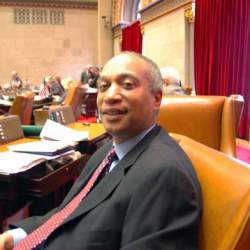
J Gary Pretlow Authored an Online Poker Bill for New York in 2014, but it did not get out of committee
New York State Assemblyman J. Gary Pretlow authored an op-ed article in Roll Call in which he criticized Restoration of America’s Wire Act. Assemblyman Pretlow has been the premier advocate of online gambling in the recent past, having introduced an online poker bill in 2014.
Ultimately, Pretlow’s gambling bill failed to gain momentum in the New York Assembly, for a variety of reasons. The assemblyman had said in January 2015 he hoped to introduce a similar bill this year, but hope seems to be fading Pretlow will make such an attempt. Hesitation to re-introduce a bill which failed to gain votes last time is not a sign he has changed his attitudes on the online gambling debate, though.
When Congress Shouldn’t Act
Pretlow’s article, titled “When Congress Shouldn’t Act: Let States Advance Economic Growth and Protect Consumers“, makes that clear. “When Congress Shouldn’t Act” was published in the Beltway Insiders section of Roll Call, which provides political analysis on subjects ranging from procedure to ethics and from money in politics to the art of lobbying.
J. Gary Pretlow’s article stated his case when he wrote, “As nearby states such as New Jersey and Delaware have adopted well-regulated systems, they’ve seen a corresponding increase in tax revenue, and the security technology they have employed has not only kept gaming safe within their borders, it has created a legal system where law enforcement can crack down on the fraud and any other illegal activity that currently runs rampant in the robust online black market.”
Three Points against RAWA
The op-ed piece pointed out three reasons to oppose RAWA. One, legalized online gambling is a way to generate additional revenue for state treasuries and help casinos in remote areas of the state draw in a little extra cash.
Two, a ban on licensed online gambling would leave states without the technology or system to police gambling in their states. The irony of the arguments by Lindsey Graham and Jason Chaffetz–RAWA’s two primary advocates in the US Congress–is they justify RAWA as a way to protect their state’s right to ban online gambling. Legal online gambling sites in New Jersey, Nevada, and Delaware use geolocation software to assure players in other states cannot gamble for real money on those sites–and the system has been remarkably successful. RAWA would do away with such protections, allowing illegal operators to target gamblers throughout America (as they do now), but without any legal alternatives for those gamblers.
Three, legal online casino and poker gambling gives states more leverage and better funding for cracking down on illegal operators. New Jersey is an example of what can be done with a legal framework for online gaming, as the Division of Gaming Enforcement and the Department of Justice have been able to threaten legal action against illegal operators. Only the most dedicated illegal operators remain in the state, as the profit margin has been seriously undermined by the presence of a legal and legitimate alternative mode of gambling.
New York Would Lose $3.1 Billion
Pretlow made a specific appeal to New York lawmakers to vote against RAWA by contending that New York would lose $3.1 billion in revenue each year from the law. In his article, Pretlow wrote, “In New York, our lottery helps to fund education–to the tune of $3.11 billion dollars in fiscal 2014-15 alone. That’s 14% of our state’s overall funding to educate over 2.7 million students. RAWA would ban online lotteries, risking education dollars in New York and over a dozen other states around the country.”
The assemblyman added that about 1 million Americans spend over $3 billion every year on the illegal online gambling industry. That money goes to illegal offshore operators, because some US players are willing to risk playing on potentially shady websites. If a legit online gambling industry was allowed to exist in the USA, the vast bulk of that money would go to licensed websites which are regulated, licensed, and taxed.
RAWA Would Cause Exploitation of Children and Consumers
Pretlaw said, “Prohibition doesn’t work, it merely exposes children and consumers to a system primed to exploit them.”
Prohibition of an activity only works when normally law-abiding citizens agree with the ban. If everyday American citizens see a government ban as an infringement of their rights–such as the Prohibition Era’s 100% total ban on alcochol–people simply stop obeying the law. Like in that case, banning a popular pasttime only forces consumers to deal with illegal operators, black marketers, and organized crime.
RAWA Would Trample State’s Rights
To end his Roll Call article, Assemblyman Pretlaw made a traditional appeal to state’s rights. He said he was against a federal law which would take away New York’s traditional ability to regulate its own gaming market.
In the ending to his op-ed piece, the New York lawmaker said, “New York, and every state, deserves to be able to determine what gaming exists within its borders and how it is regulated–we always have had that right and it defies logic that Congress would step in now to undercut it. Congress should focus on the things that will help states, not those policies that aim to take away our power to do right by our constituents.“
